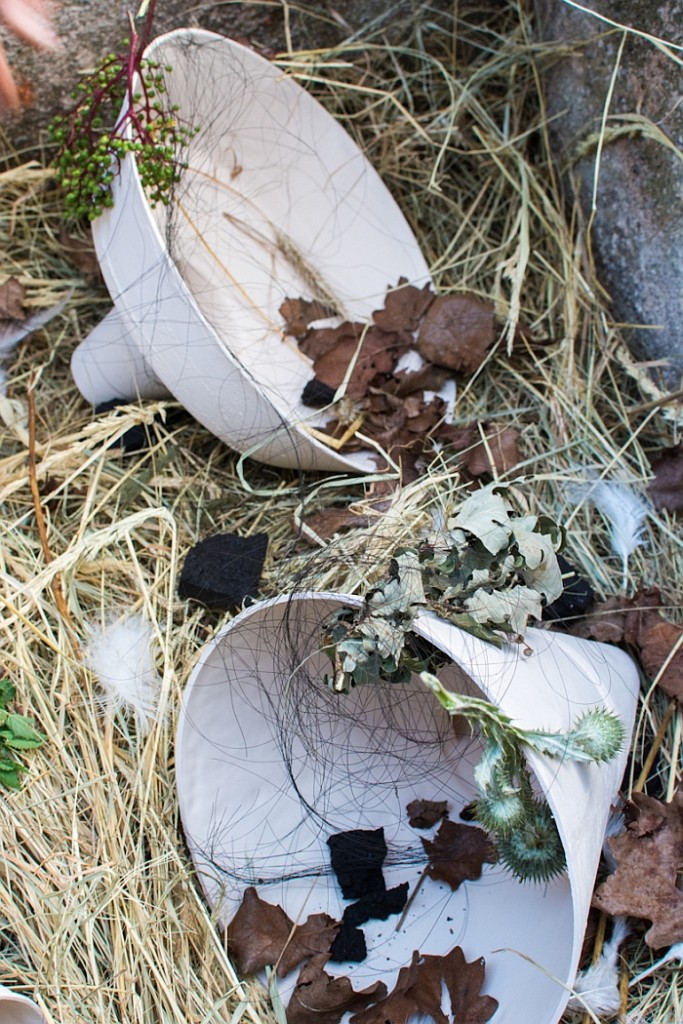The question as to what “home” means has never been an easy one to answer, and in our global age of networked, anonymous, communities, our age of refugees and migrant workers, our age of abstract “Homeland Security” agencies, the question has in many ways become even more complicated.
The Lamp Heimat (Homeland) by Berlin based designers Birgit Severin and Guillaume Neu-Rinaudo is an attempt to approach an answer.
Birgit Severin and Guillaume Neu-Rinaudo met while studying at Design Academy Eindhoven, Bielefeld born Birgit studying Contextual Design, Parisian Guillaume Social Design, the pair now share a studio space in Berlin, Heimat Lamp is their first joint project and was realised in context of the Ampelhaus Oranienbaum’s 2015 exhibition “Lost and Found” and on the basis of a brief which asked them to develop a project in the course of a one month residency, and using local materials.
“In Oranienbaum there is a noticeable feeling of emptiness” explains Birgit Severin the background to the project, “something which is intensified by all the abandoned mining facilities in and around the town. And so we started researching the background to why the mining industry died out, what used to happen there, what was happening now, and in the course of this research learnt that the nearby Vockerode power station had been one of the biggest power plants in Germany, until it was forced to close following the fall of the wall. And so you had the coal mining and the power generation which both stopped and that meant large-scale unemployment and led to people leaving the area.”
The Heimat Lamp collection is Birgit Severin and Guillaume Neu-Rinaudo’s attempt to capture that story in objects, to give form to the ghosts of lives past, and for all to develop a sense of home. Of Heimat.
“Fire is both light and warmth but when it’s gone it’s gone, the fire goes and what you’ve burnt vanishes”, explains Guillaume, “and so we thought that given the history of the area fire was a nice symbol and so we decided to work with a burning process and to try to capture the feeling of industry, home, memories.”
To that end Birgit and Guillaume decided to work with primitive kiln firing; essentially a fire was laid in an old well, pre-fired ceramic lamps placed on top and then covered with a mix of wood and wallpaper from abandoned buildings in the area, as well as hay, grass and herbs from neighbouring farms. The kilns were left to burn overnight and in the morning the traces of the locality were burnt into the porcelain.
The result is a series of ceramic lamps which just like Oranienbaum proudly display the scars of their recent history; for Oranienbaum that is the industrial ruins, the feeling of loss and the infrequent bus service to neighbouring, bigger and more important, towns, for the Heimat Lamp it is the scorch marks, the atmosphere of smoky silence and a delicate permanency.
And before anyone accuses us of drowning in pathos, or being too harsh on Oranienbaum, let us not forget that in 1999 it was the sight of wind felled trees in the grounds of Schloss Oranienbaum which inspired Jurgen Bey to realise his deliciously decadent Tree Trunk Bench. While Fabriek van Niek a.k.a. Niek Wagemans transformed the wealth of salvageable raw materials in Oranienbaum into Ampelhauses’ jouyously unpretentious wunderBARR cafe/bar. For all its problems, the town inspires, or, and to paraphrase Thomas Lommée’s recent description of Brussels “its problematic and therefore potentially interesting”
The forms of the various Heimat lamps don’t originate from Birgit and Guillaume, but rather are based on generic lamp forms from the period of Oranienbaum’s economic joys. The original plan had been to use original lamps from the original buildings, a plan thwarted by a combination of scavengers and bureaucracy. Sadly, because a quick look at archive photos gives an idea of what could have been possible, and as Guillaume adds, “even without finding an actual lamp we could possibly have found something else which could have given us an idea, served as an inspiration.”
Obviously a ceramic lamp fired in a hole in the ground has only limited options as a mass market product. But then that’s not the point.
On the one hand the Heimat lamps were created in response to a brief as part of an exhibition and met that brief in a highly poetic and critical fashion.
And on the other the extrapolation scale for such a project is not one in terms of volume but of scope. What one can realise in Oranienbaum can be repeated in other towns, other regions and not necessarily with the same post-industrial story or in the form of a lamp, but in site specific explorations of the local history, and for all with explorations of local associations of home.
Which of course just leaves one question unanswered, neither Guillaume nor Birgit live where they were raised, but where they have chosen, what do they understand by “home”, by “Heimat”
Birgit: If you look at the dictionary definition of Heimat it is the place where you are born, the place where you come from, however when you move away from there, the place where you are currently living becomes more familiar, more relevant to you and then Heimat becomes in a way “a home which is foreign”
Guillaume: I think you have to go away to understand what it means, I don’t think you can say that somewhere is your Heimat, it is always somewhere where you used to be and where you’ve left memories.
More details on the Heimat Lamps, Birgit Severin and Guillaume Neu-Rinaudo can be found at http://birgitseverin.com & http://guillaumeneurinaudo.com
And for all in Milan for Fuorisalone 2016, the Heimat Lamps will be on display as part of the group exhibition “The Journey of Things” at Via Ventura 2, (Ventura Lambrate), 20134 Milano from April 12th – 17th

(All photos © & courtesy Birgit Severin and Guillaume Neu-Rinaudo)